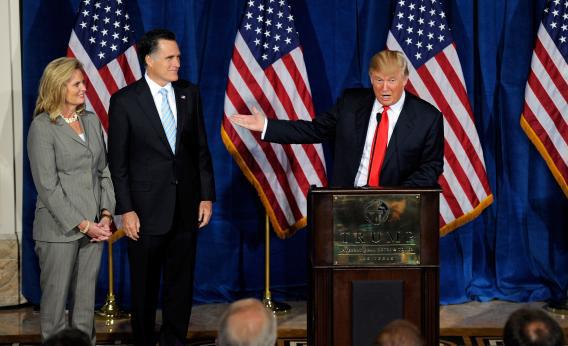Politics and cynicism go hand in hand. How else can someone survive the need to please electoral constituencies with diametrically opposed interests—American labor, for instance, and environmentalists in Obama’s case, angry Tea Party voters and hedge fund managers for Team Romney. Half-truths and obfuscation in such a situation is a given, and after a few election cycles, even the most ardent supporter of one political pursuasion or the other comes to accept it as fact: Politicians lie.
That does not mean that politicians can’t be tactical in doling out their promises or exhibit a sense of timing. Friday brought an example of just how difficult the next few months will be for Romney.
Firstly, rather than savoring what should have been a knockout punch delivered to his GOP opponents in Florida last weekend, Romney spent the week denying he would like to have poor people served at state dinners in a Romney White House. The gaffe in question has been sliced and diced to death—somewhat cynically, I think, since it’s clear that he was just trying, inarticularly, to say he would focus his efforts on helping America’s rattled middle class. Even if the media has poured salt on the wound, though, Romney unholstered the gun, pointed it as his foot and fired.
As a result, this morning, as the monthly jobs figure loomed and surveys suggested good news for Obama, Google News results for “Romney” are a litany of stories like “Romney Says He Mispoke” (AP), “Trump Backing Romney as Candidate Defends Remark on ‘Poor,’ ” (BusinessWeek) and this evisceration from Bush speech writer Michael Gerson in the Washington Post.
Understand, this is not a post about economics—we’re talking cynical, down and dirty politics. And in that sanse, Romney has a real problem. As Sebastian Mallaby points out in the Financial Times today, “Romney has an enemy more terrible than any mortal rival: he has a problem with the Vision Thing. Despite the fuss about his tax returns, his trouble is not that he made millions as a private equity baron. It’s that managerial credentials are all he has going for him. His campaign is devoid of an animating idea.” Mallaby, who leads the Center for Geoeconomic Studies at the Council on Foreign Relations, goes on to advise Romney how he could address this problem—primarily by stressing long-term debt reduction.
Contrast that with Obama’s “rope-a-dope” performance so far. Yes, he’s been a mediocre wielder of the White House “bully pulpit”—generally failing to decisively outflank the House. But he also judged, rightly, that time is on his side. The GOP House is divided and deeply unpopular (as are many of its principles). With jobless numbers on a slow trajectory of improvement, putting himself out there on the campaign trail makes sense only in small doses.
And so, today, as Romney shifts uncomfortably in various interview chairs, Obama pops up on CNBC and other news channels right after today’s positive jobs news (unemployment dropping to 8.3 from 8.5 percent) to associate himself with the event—and deliver an unspoken “I told you so.”
There’s a long way to go until November, and polls still suggest this is—or should be—a horse race. But Romney to date shows little of the agility he’ll need to deal with the light-footed president. Whatever else you think of either man, or their particular brand of economics, they simply are not in the same class as campaigners. This leaves Obama free to pick his shots, practice looking presidential—take a foreign trip or two—while House vents its spleen and Romney begins what will be an excruciating tack back toward the tolerance and reason that the country’s moderates will demand in the general election.
Right now, you’ve gotta like Obama’s chances.
Michael Moran is Director and Editor-in-Chief of Renaissance Insights, at Renaissance Capital, the emerging markets investment bank. Follow him on Twitter, subscribe to his Facebook feed, or preorder his book, “The Reckoning: Debt, Democracy and the Future of American Power,” coming in April from Palgrave Macmillan.
